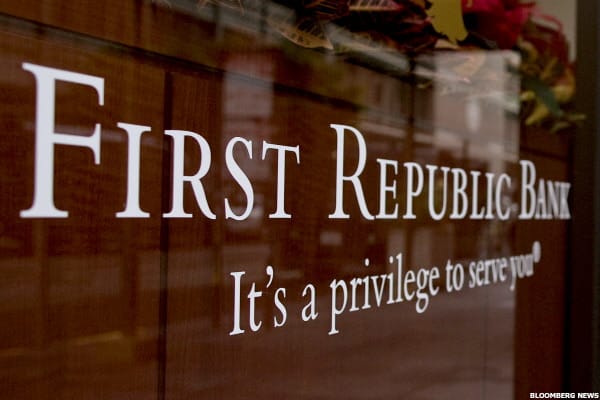
First Republic Bank (FRC) shares were halted from trading on the New York Stock Exchange Monday after California regulators, along with the Federal Deposit Insurance Corp., brokered a sale of the struggling lender and wealth manager to JPMorgan Chase (JPM).
The California Department of Financial Protection and Innovation late Sunday took control of First Republic, while appointing the FDIC as its official receiver. The agency also announced that JPMorgan -- the bank which in March led a $30 billion effort to boost First Republic's deposit base -- had emerged as the preferred bidder for the bank's assets.
PNC Financial Services Group (PNC) and Citizens Financial (CFG) were also involved in the bidding process for First Republic, according to multiple media reports.
The receivership sale marks the second U.S. bank failure in as many months, following the collapse of SVB Financial in early March, amid a series of unrealized losses on Treasury bond holdings that accumulated amid the Federal Reserve's nine interest rate increases over the past 12 months.
JPMorgan Takes $173B of First Republic Loan Book
JPMorgan will take on $173 billion of First Republic's loan book, the regulators said, while purchasing $30 billion in securities from its balance sheet and $92 billion in deposits.
The FDIC will take a $13 billion hit from the sale, with JPMorgan contributing $10.6 billion as partial cover. The bank will also book a one-off $2.6 billion gain from the deal, it said, while incurring around $2 billion in restructuring costs over the next 18 months.
The deal does not include either First Republic's debt nor its preferred or common stock.
"Our government invited us and others to step up, and we did," said CEO Jamie Dimon. “Our financial strength, capabilities and business model allowed us to develop a bid to execute the transaction in a way to minimize costs to the Deposit Insurance Fund.
“This acquisition modestly benefits our company overall, it is accretive to shareholders, it helps further advance our wealth strategy, and it is complementary to our existing franchise," Dimon added.
First Republic shares were marked 35% lower in pre-market trading but were halted before opening on the NYSE, while JPMorgan shares gained 3.2% to $142.67 each.
First Republic Troubles and Collapse
At its peak in November of 2021, First Republic was one of the nation's 15 largest banks, with 80 offices in seven U.S. states and a market value of just under $40 billion.
First Republic's troubles, which were first linked to the failure of SVB in early March, intensified over the following weeks as investors worried that its deposit base, which consisted of many wealthy account holders whose holdings sat above the FDIC's $250,000 insured threshold, would withdraw funds and move to a larger institution.
First Republic itself in mid-March attempted to stave off that deposit flight when it tapped around $70 billion in available liquidity support from both the Federal Reserve and "additional financing" from JPMorgan.
The bank also had access to the Fed's new “Bank Term Funding Program” program, which enables U.S. banks to borrow billions at favorable market terms if the loans are backed by Treasury bonds, high-quality agency debt or mortgage-backed securities.
Still, the bank reported last week that overall deposits were down $71.9 billion, or 41%, from end-December levels to $104.5 billion over the three months ended in March.
The $104.5 billion total, as well, includes the collective $30 billion that was added to the bank's deposit base by a group of Wall Street lenders, led by JPMorgan, following Silicon Valley Bank's failure.
“We should acknowledge that bank failures are inevitable in a dynamic and innovative financial system,” the FDIC's Jonathan McKernan said in a statement. “We should plan for those bank failures by focusing on strong capital requirements and an effective resolution framework as our best hope for eventually ending our country’s bailout culture that privatizes gains while socializing losses.”
Get investment guidance from trusted portfolio managers without the management fees. Sign up for Action Alerts PLUS now.







